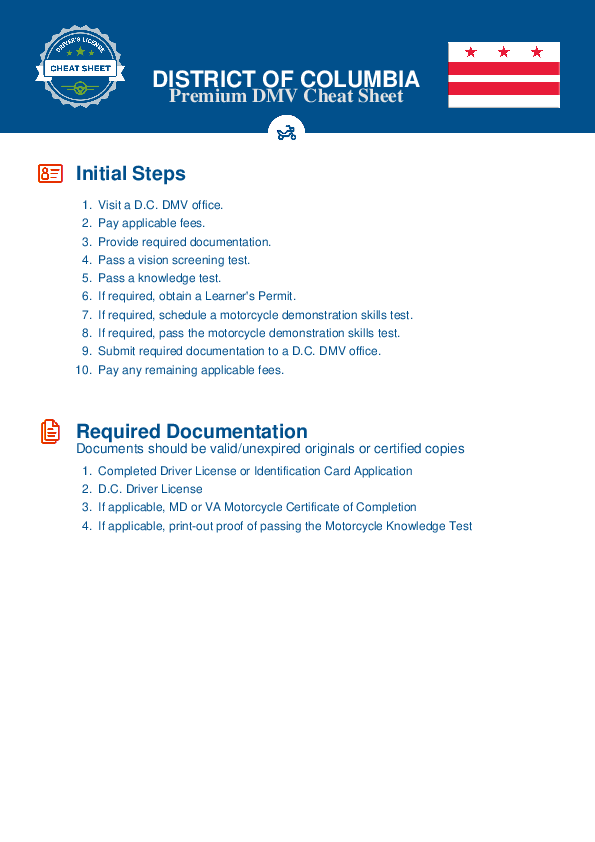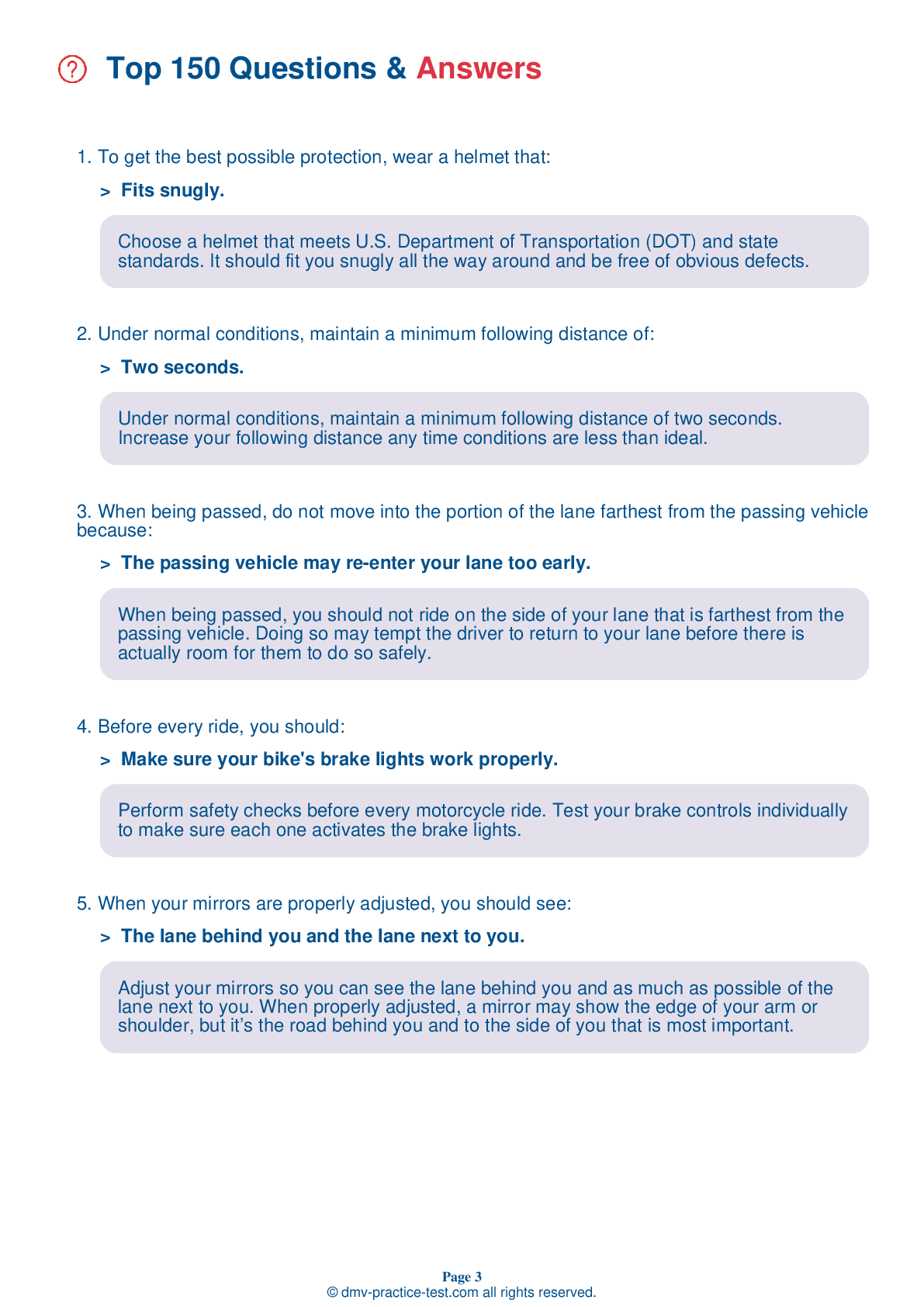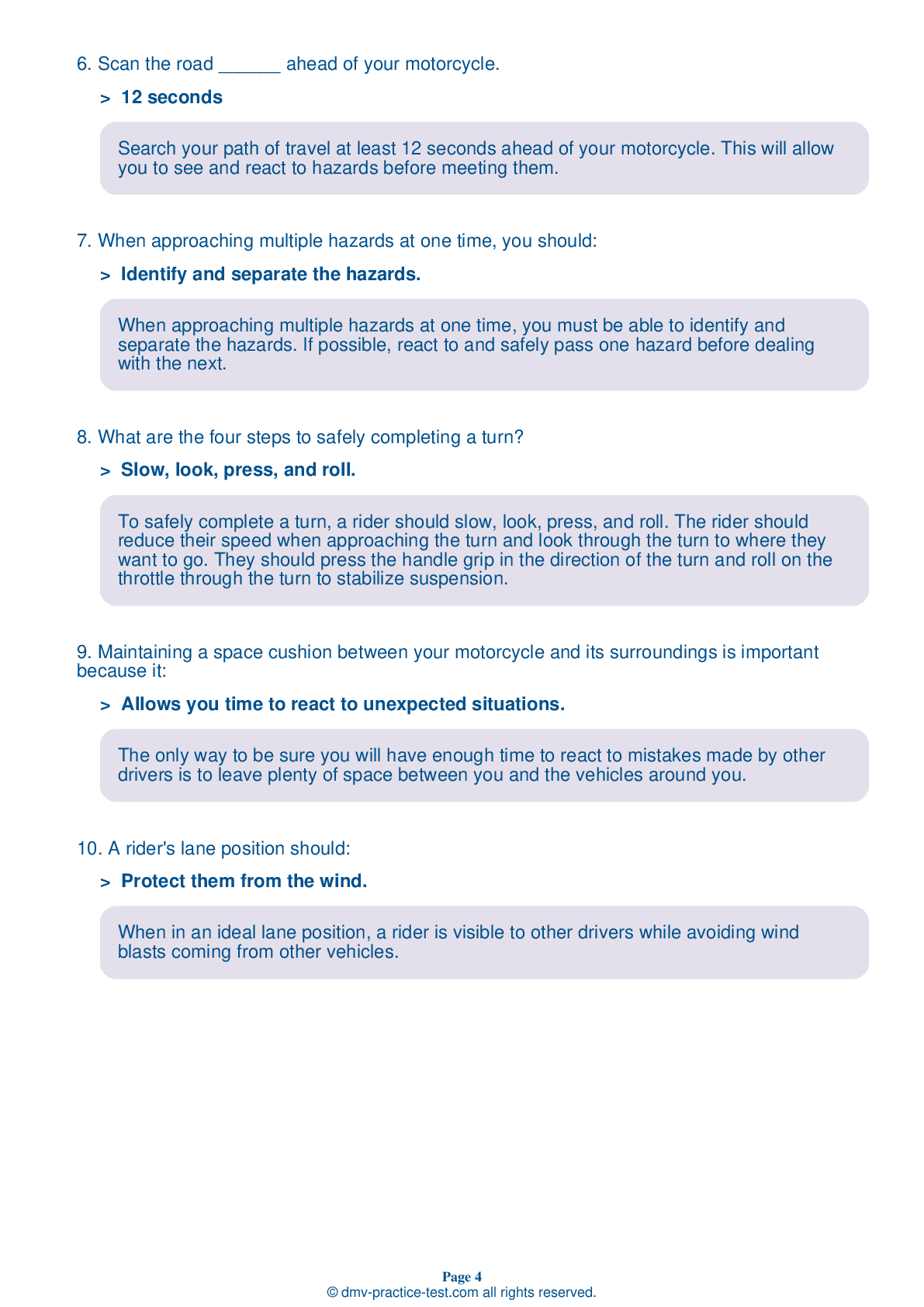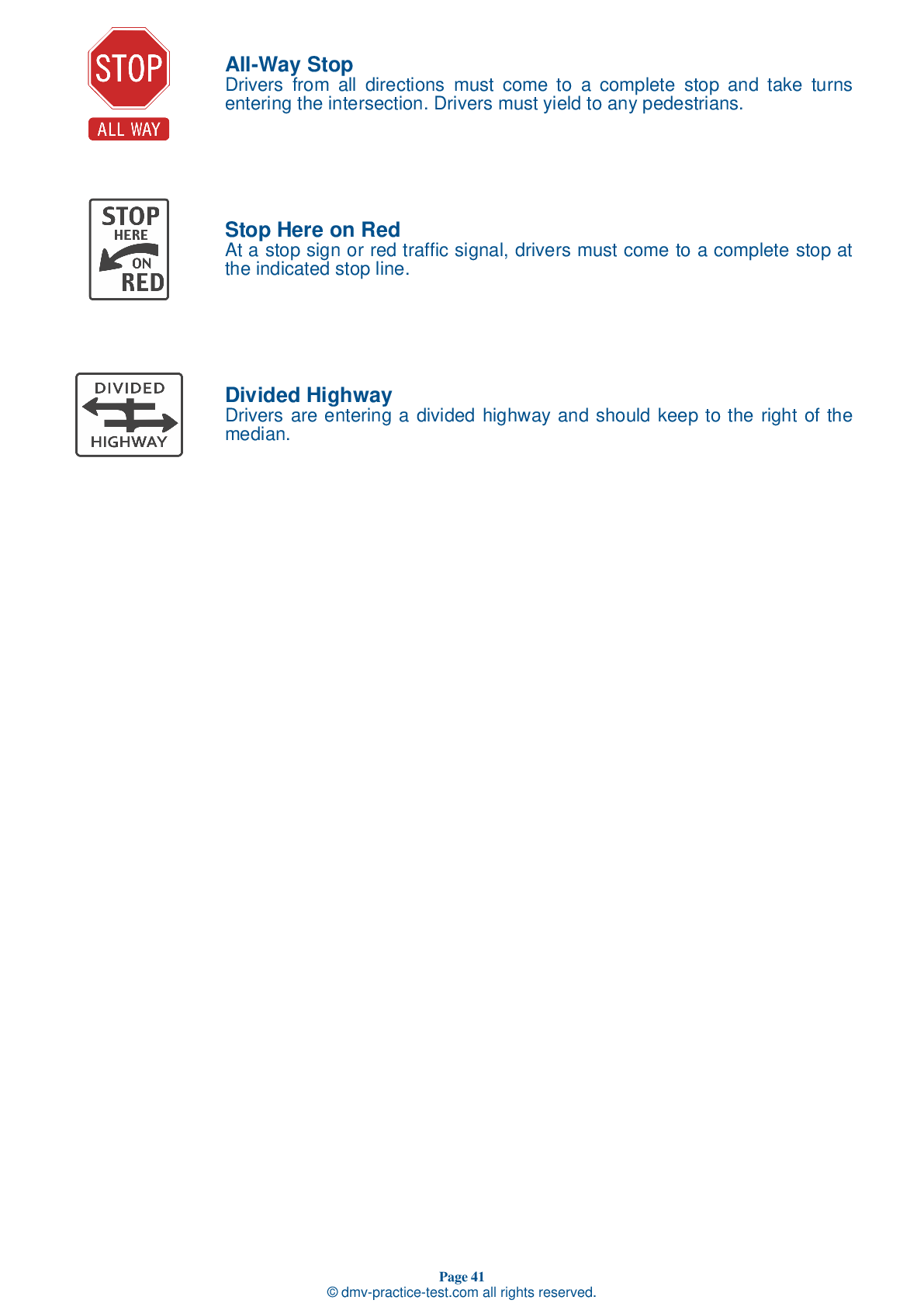DMV Permit Test #5
Motorcycle Test | License DC 2026 | FREE Online Practice! #5
Take this FREE motorcycle test (license in DC 2026) to check your knowledge of the road rules. To improve your results, download a motorcycle handbook online, study theory, and practice for free on our website. Still worried about how to get a motorcycle license in District Of Columbia in 2026? Check our website for more sample tests, train as much as possible, and boost your grades!
25
20
16
1 . When you have mounted your motorcycle, you should do all of the following, except:
Make sure the clutch works smoothly.
After mounting your motorcycle, you should make sure the clutch, throttle, horn, and brakes all work properly. Clean and adjust the mirrors and make sure that the fuel supply valve is open.
2 . If a tire goes flat while riding and you must stop, it is usually best to:
Use both brakes and stop quickly.
If one of your tires fails, hold the handgrips firmly and begin to slow down by easing off the throttle while maintaining a straight course. If you must brake, gradually apply the brake of the tire that is still good, if you are sure of which tire that is. Edge toward the side of the road as you slow down, squeeze the clutch, and stop.
3 . In any crash, you have a better chance of avoiding serious injury if you do all of the following, except:
Have a windshield.
You can reduce your risk of injury when riding a motorcycle by wearing an approved helmet, face or eye protection, and protective clothing.
4 . How much of a motorcycle's total braking power can the front brake supply?
About 70 percent
The front brake of a motorcycle is more powerful than the rear brake. It supplies at least three-quarters of the motorcycle's total stopping power.
5 . How fast you ride should depend on all of the following factors, except:
Your schedule.
Your speed should be determined by traffic conditions, road conditions, weather conditions, visibility, and the presence of pedestrians or bicyclists. Always ride within the posted speed limits unless any of these conditions require you to travel more slowly.
6 . Taking a turn too fast:
Can cause you to end up in another lane or leave the road.
Taking a turn too fast is dangerous. If you cannot hold the turn, you may end up turning into another lane or even off of the road entirely. Use caution when taking a turn.
2026 District Of Columbia | Frequently Asked Questions
To acquire a motorcycle driver's license in the District of Columbia, you must first obtain a motorcycle permit. This requires passing a knowledge test. After practicing with the permit, you can apply for a license, which involves passing a motorcycle skills test. Alternatively, completion of an approved motorcycle training course can bypass these requirements.
In the District of Columbia, the minimum age for obtaining a motorcycle driver's license or endorsement is 18 years old. However, those who are 16 or 17 can apply if they have parental or guardian consent, have completed a motorcycle training course, and meet other licensing requirements.
Yes, you do. In the District of Columbia, you must have a motorcycle (Class M) endorsement on your driver's license to legally operate a motorcycle. To obtain this, you must pass a knowledge test, motorcycle skills test, and vision screening. Alternatively, completion of an approved motorcycle training course can waive the skills test.
To apply for a motorcycle driver's license in the District of Columbia, you'll need: a valid DC driver's license, proof of identity, proof of social security number, two proofs of DC residency, and a certificate of completion from an approved motorcycle training course if you want to waive the skills test.
Yes, you will need to take a written exam for a motorcycle license in the District of Columbia. This test covers topics such as basic motorcycle operation, safety practices, road rules, and traffic signs. It is designed to ensure that you understand the necessary knowledge to operate a motorcycle safely on the roads.
The motorcycle written test in the District of Columbia covers a range of topics including traffic laws, motorcycle operation and handling, road signs, and safe riding techniques. It also tests your knowledge on handling emergencies and mechanical problems. The questions are based on the information provided in the DC DMV Motorcycle Operator Manual.
No, in the District of Columbia, completing a motorcycle training course does not exempt you from the written test. The training course can only waive the riding skills test. You are still required to pass the written knowledge test to receive your motorcycle endorsement or permit.
To enroll in a motorcycle training course in the District of Columbia, you first need to find an approved course provider. Once you've chosen a provider, you'll need to register for the course, which typically involves paying a fee. The course will include both classroom instruction and hands-on training. Upon successful completion, you'll receive a certificate which can be used to waive the riding skills test at the DMV.
No, you do not need to own a motorcycle to take the license test in the District of Columbia. You can use any motorcycle that is registered, insured, and passes a safety inspection. If you're using someone else's motorcycle, you must have their written permission.
Yes, you can use a friend's motorcycle for the driver's license evaluation in the District of Columbia. However, the motorcycle must be legally registered, insured, and pass a vehicle safety inspection. Also, you must have written permission from the owner to use it for your test.
Yes, in District Of Columbia, specific motorcycle handling skills are tested during the driving exam. These skills include starting and stopping, turning and swerving, and quick stops. The exam also tests your ability to balance the motorcycle at slow speeds. It's crucial to demonstrate safe handling and control of the motorcycle throughout the test.
Yes, in the District of Columbia, new motorcycle drivers are issued a learner's permit before a full license. The permit has restrictions such as no passengers, no driving on highways, and only driving during daylight hours. After 30 days or completion of a motorcycle safety course, they can apply for a full license.
Yes, your District of Columbia driver's license with a motorcycle endorsement allows you to operate a motorcycle in other states. However, it's important to understand each state's specific rules and regulations concerning motorcycle operation, as they can vary. Always follow local traffic laws when traveling out of state.
Yes, in the District of Columbia, it is mandatory for all motorcycle riders and passengers to wear a helmet. The helmet must meet the U.S. Department of Transportation (DOT) Federal Motor Vehicle Safety Standard (FMVSS) 218. This law is enforced to ensure the safety of motorcycle riders and passengers.
In the District of Columbia, there are two types of motorcycle licenses: a motorcycle-only license and a motorcycle endorsement on a regular driver's license. The motorcycle-only license allows you to operate only motorcycles, while the endorsement allows you to operate both motorcycles and other vehicles, based on the class of your regular driver's license.
Yes, you can add supplementary endorsements to your motorcycle license in the District of Columbia. This allows you to operate different types of vehicles. However, each endorsement may require additional tests and fees. It's advisable to contact the District of Columbia Department of Motor Vehicles for specific details and requirements.
Yes, in the District of Columbia, the motorcycle written exam is available in multiple languages. This includes Spanish, Amharic, Chinese, French, Korean, Vietnamese, and others. However, it's advisable to confirm with the DMV about the availability of your preferred language before scheduling your exam.
One effective strategy to prepare for the motorcycle license test is to study the District of Columbia Motorcycle Operator Manual thoroughly. It covers all topics that will be on the test. Also, taking online practice tests can be very helpful as they simulate the actual exam and help you familiarize yourself with the format and type of questions asked.
Yes, in the District of Columbia, the Department of Motor Vehicles (DMV) offers the motorcycle written exam in several languages other than English. These include Spanish, French, Amharic, Chinese, Vietnamese, Korean, and more. However, it's recommended to confirm with your local DMV office about the availability of specific languages.
If you don't pass the motorcycle written test in the District of Columbia, you are allowed to retake it. However, you must wait at least three days before your next attempt. There's no limit to the number of times you can retake the test, but each attempt requires a new fee.



